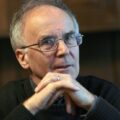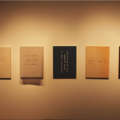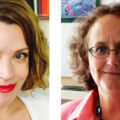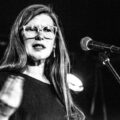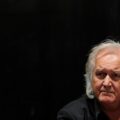The Scandalous Confessions of a Lesbian Formalist Poet

Hello, Prose. Poet here. I know exactly what prose is. Here is a sentence inside a paragraph. Sentence follows sentence, paragraph follows paragraph, and then the prose ends. Even if this is a prose poem, it still participates in prose, and everyone knows it.
Some poets were arguing on Facebook. A had his teeth in B’s pant leg, and wanted to know: What is the difference between poetry and prose? “But what is the difference? You’re not saying,” A insisted to B, a distinguished poet and professor of poetry. Then I thought of an answer I’d never heard before.
Prose writers don’t ask what prose is, but poets perpetually ask what poetry is. And that is the difference between poetry and prose, right there. Here I am at the end of this paragraph of sentences, and I never once asked myself what prose is.
There are so many different varieties of prose. Am I talking about genre? No. Am I talking about the history of prose? No. So what am I talking about? It’s about form, and something else I don’t have a name for. This something else is a mystery, and mysteries (or Mysteries, as Keats fashions them in his definition of negative capability: “capable of being in uncertainties, Mysteries, doubts, without any irritable reaching after fact and reason”) are essential to poetry, but not to prose.
So am I talking about murder mysteries? No, dear, I am saying that you must be a poet, because you are asking so many questions.
Before I write a poem, I ask myself what poetry is. I don’t know, and I still don’t know, even though I’ve written hundreds of poems. I have swarms of questions about poetry buzzing around my head. What is it for? What does it do? How is it done? Can I do it? Do I know how to do it? Then while I’m writing a poem: Is this any good? What good will it do? Will anyone think this is a poem? Do I think it’s a poem? Then after I write a poem: How is this a poem, really? What does it mean? Where did it come from? Does it fit anywhere?
These questions are asked by a poet obsessed with poetry. They are perfectly natural questions to me, so natural that I’ve never bothered writing them down before.
Negative capability is hard when, say, you’re looking for reasons to live and facts keep slipping through your fingers. Perhaps this is why I became a formalist poet. Traditional or received forms inherently answer the question of what poetry is.
I turn to the most popular and recognizable form, the sonnet, with the assurance that at least on the level of meter, rhyme, and line count, my sonnet looks like poetry. Poets who write without a received form or outside any tradition must intensify their search for the definition of poetry. The question here isn’t whether a poem is great or amateurish, fresh or stale, original or clichéd. That is a question for critics.
Poets who say that they’ve written a poem answer with each poem the question about what poetry is. The poem represents the poet’s answer to the question. The poem may or may not have line breaks, which is only the entry-level answer to the question. The deeper and higher parts of the question concern the ineffable quality that perpetuates the question. It’s a question that needs to be asked perpetually, or the poet is writing prose with line breaks.
The critics’ job is to answer in prose what poetry is, and to opine on the quality and historical context of poetry.
There is one literary critic who is so devoted to answering the question of what poetry is, that even though he isn’t a poet, he was awarded a position typically reserved for poets, the Oxford Professor of Poetry. What Sir Christopher Ricks writes isn’t poetry. It is prose. But it is prose that probes so deeply and comprehensively into the Mysteries of poetry that the poems he discusses seem to live in his prose. Such is the power of this distinguished literary critic that when Ricks presented Bob Dylan as a poet, Dylan won the Nobel Prize for Poetry.
Ricks answered the question—what is poetry—for someone who, in an interview, identified himself as an “artist.” This classification, for all we know, may be the non-binary future of poetry. Meanwhile, I’m grateful to Ricks for helping me to understand Paradise Lost through his beautiful writing about the music of Milton’s poetry, and for showing me the poetry in Dylan through his beautiful writing about Dylan’s lyrics.
I lifted a word I’m using here, “perpetual,” from a video interview of another distinguished literary critic, Harold Bloom, who said that the canonical is perpetually relevant. He was promoting his book, The Western Canon: The Books and School of the Ages, promoting the books he included in his canon, and implicitly promoting his vision of what poetry is.
Here we must walk the line between what poetry is and what poetry is canonical. In whose hands is the poem at this moment? Like foster children, poems are dependents with a life of their own. They are often handed from one person to the next with little comprehension or compassion. Sometimes they are mutilated (Emily Dickinson) or destroyed (Sappho).
In a video, the editor of Poetry magazine, Don Share, said “Poetry survives the errors of its beliefs.” The relevancy and survival and canonization of poetry form the bedrock of what poetry is.
In 1980, at the end of a spring semester of graduate school, I walked across the Columbia University quad of towering gray citadels with my Milton professor. I had studied Paradise Lost intensely in institutions of higher learning, as usual asking myself perpetually what poetry is. I felt small next to my professor, and I was, as usual, starving.
He asked me how I liked Milton, and I replied that I didn’t feel I was “in there.” He stopped and turned to me and waved his hands in the shape of my body and said that my idea is so tentative, so fragile … and we went our separate ways.
While I loved the poetry of Homer, Chaucer, Spenser, Shakespeare, and Milton, I didn’t love it deeply because in many ways, it’s irrelevant to me. My parents disowned me. I had no family connections at all. I was penniless. I was never going to have an affair or marriage with a man, or have a child, or go to war. I connected most with Spenser’s quest story and strange language, but in general I felt suppressed and silenced by this massive canon. It would never belong to me, I would never belong to it. If I wanted to know what poetry is, I’d have to figure it out on my own.
Now that the hardest part is over, I feel lucky to have been an outsider with this quest thrust on me, because it made me a poet. I grew to love and study the canon of lesbian and women’s poetry. When I started writing in form, I felt that my internal warring canons, Western and Women, were at peace.
To all the distinguished professors and critics who promote the Western Canon, also known as their version of what poetry is, I have something to say.
Your canon is fine, but only up to a point.
You may adore Whitman, Yeats, Crane, Eliot, Larkin, Stevens, Auden, Ashbery, with an adoration that makes your heart race, but as Bloom admits, it’s your taste. My heart races for Lady Mary Wortley Montagu, Christina Rossetti, Charlotte Mew, Amy Lowell, Hilda Doolittle, Muriel Rukeyser, June Jordan, Adrienne Rich, Judy Grahn, and I see no reason why they shouldn’t be canonized. Instead, they are, for the most part, when it comes to defining the Western Canon, perpetually ignored, erased, excluded, and mocked.
How do you think it makes me feel, when poetry I love so dearly is treated so badly? I also feel ignored, erased, excluded, and mocked. I take it personally.
I have fought my way through these conditions for over 40 years. Bloom mocks poets who feel this way by calling them the “School of Resentment.” I say that Bloom belongs to the “School of Arrogance.” Ninety-nine percent of the time, my poems are only accepted at journals edited by women, lesbians, or gay men. The gatekeeper positions of power are not generally held by women, lesbians, or gay men.
I try not to let exclusion resentment interfere with my pursuit of what poetry is, but it’s a tempting fantasy, as suggested by Jill Solloway and Eileen Myles, that we should have a 100-year ban on men writing poetry. That would be poetic justice. While we’re at it, let’s boycott the word “distinguished.” It rings with the authority grabbed by only half the human race.
In a parallel universe, a new world is evolving, slowly and painfully, because the swift effectiveness of a 100-year ban is just a fantasy. In reality, and with great love and wisdom, lesbian-feminist critics like Virginia Woolf, Audre Lorde, Adrienne Rich, Terry Castle, and Lillian Faderman expand the definition of poetry by paying attention to, recovering, including, and celebrating the Women Canon.
About Mary Meriam
Mary Meriam co-founded Headmistress Press and edits the Lavender Review: Lesbian Poetry and Art. She is the author of My Girl’s Green Jacket (2018) and The Lillian Trilogy (2015), both from Headmistress Press. Poems appear recently in Poetry, Prelude, and Subtropics.

